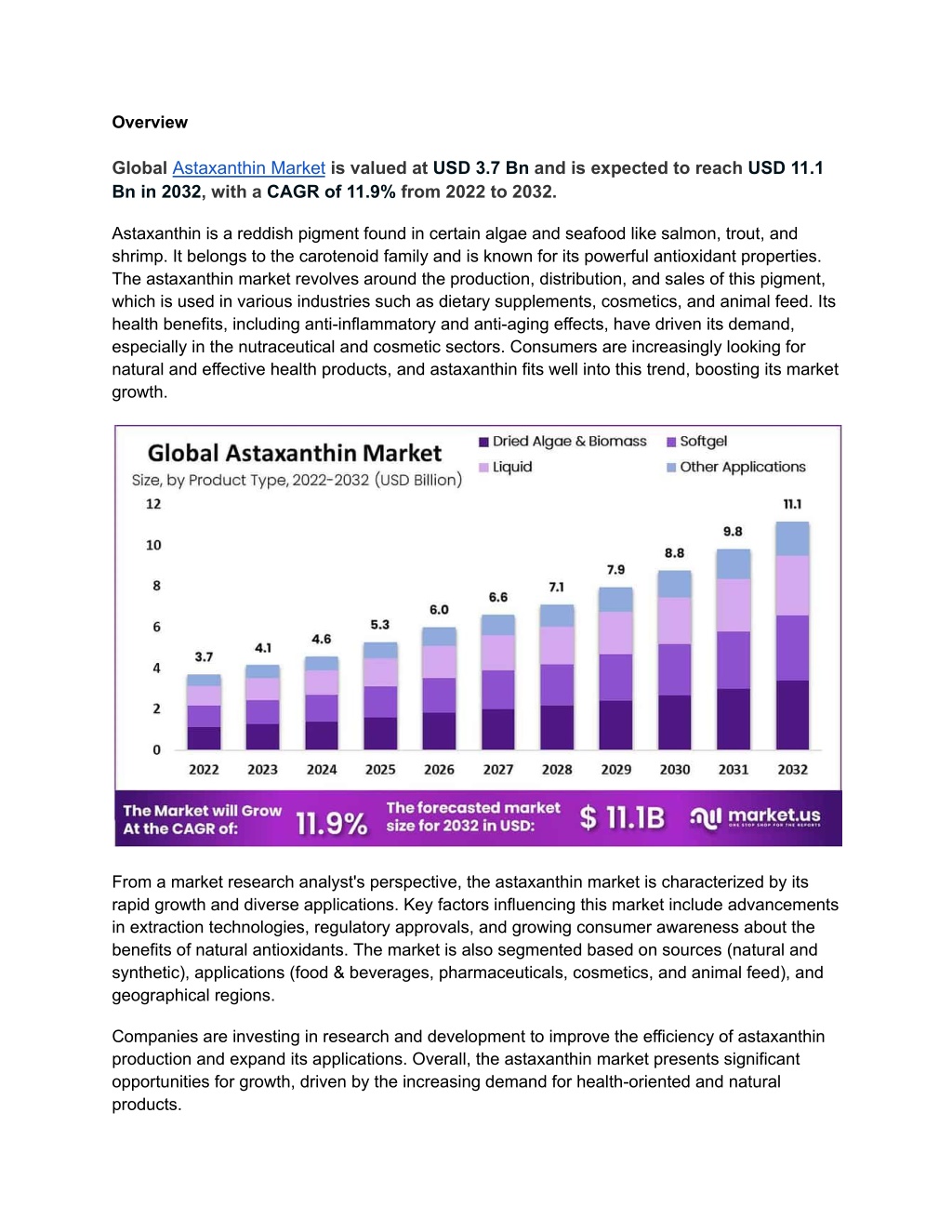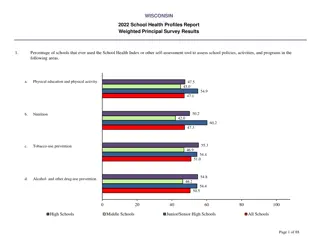
Astaxanthin Market Sees Growth in Health and Wellness Sector
Global Astaxanthin Market is valued at USD 3.7 Bn and is expected to reach USD 11.1 Bn in 2032, with a CAGR of 11.9%n
Download Presentation

Please find below an Image/Link to download the presentation.
The content on the website is provided AS IS for your information and personal use only. It may not be sold, licensed, or shared on other websites without obtaining consent from the author. Download presentation by click this link. If you encounter any issues during the download, it is possible that the publisher has removed the file from their server.
E N D
Presentation Transcript
Overview Global Astaxanthin Market is valued at USD 3.7 Bn and is expected to reach USD 11.1 Bn in 2032, with a CAGR of 11.9% from 2022 to 2032. Astaxanthin is a reddish pigment found in certain algae and seafood like salmon, trout, and shrimp. It belongs to the carotenoid family and is known for its powerful antioxidant properties. The astaxanthin market revolves around the production, distribution, and sales of this pigment, which is used in various industries such as dietary supplements, cosmetics, and animal feed. Its health benefits, including anti-inflammatory and anti-aging effects, have driven its demand, especially in the nutraceutical and cosmetic sectors. Consumers are increasingly looking for natural and effective health products, and astaxanthin fits well into this trend, boosting its market growth. From a market research analyst's perspective, the astaxanthin market is characterized by its rapid growth and diverse applications. Key factors influencing this market include advancements in extraction technologies, regulatory approvals, and growing consumer awareness about the benefits of natural antioxidants. The market is also segmented based on sources (natural and synthetic), applications (food & beverages, pharmaceuticals, cosmetics, and animal feed), and geographical regions. Companies are investing in research and development to improve the efficiency of astaxanthin production and expand its applications. Overall, the astaxanthin market presents significant opportunities for growth, driven by the increasing demand for health-oriented and natural products.
Key Market Segments Based on Type Dried Algae Meal and Biomass Oil Soft gel Liquid Others By Application Cosmetics Aquaculture & Animal Feed Food Nutraceuticals Others By Source Natural Synthetic Download a sample report in MINUTES@https://market.us/report/astaxanthin-market/request-sample/ The astaxanthin market is segmented by product type into dried algae or biomass, soft gel, liquid, oil, and others. Dried algae meal or biomass leads this segment due to its use in formulation production, minimal downstream processing, convenient bulk production, and application in animal feed. By application, the market is divided into cosmetics, aquaculture & animal feed, nutraceuticals, and others. The aquaculture & animal feed segment holds the largest market share.
Based on source type, the market is categorized into natural and synthetic sources. The natural source segment holds the highest revenue share due to its sustainability and high efficacy. Market Key Players Algatech Ltd Cyanotech Corporation MicroA Beijing Gingko Group Algal f Iceland ehf Fuji Chemical Industries Co., Ltd PIVEG, Inc. Atacama Bio Natural Products S.A. ENEOS Corporation Other key players Drivers: The astaxanthin market is driven by the increasing demand for cosmetic products, particularly in developing regions like India, China, and Brazil. Growth in cosmetic companies and the rising popularity of skin whitening products and cosmetics in rural areas are key factors. Additionally, the demand for cosmeceuticals and nutricosmetics is growing in countries such as the US and Canada, as consumers become more aware of the benefits of nutritional products for skin health. Restraints: The high cost of research and development in the astaxanthin market poses a significant restraint, particularly in developing countries like India and Brazil with limited healthcare infrastructure. Side effects associated with improper consumption of astaxanthin, such as headaches and stomach pains, further hamper market growth. The lack of R&D activities in African countries like South Africa, Nigeria, and Egypt also limits the adoption of cosmetic products.
Opportunities: The growing demand for advanced treatments in the aquaculture market presents significant opportunities for the astaxanthin market. Government initiatives, such as India's Pradhan Mantri Matsya Sampada Yojana, support the expansion of the aquaculture sector and provide flexibility and support for the development of the aqua feed industry. This growth in aquaculture is expected to boost the astaxanthin market. Trends: Improvements in research and healthcare facilities are driving market growth. The rising demand for nutraceuticals, due to their antioxidant properties, and the increasing use of astaxanthin in animal feed and aquaculture markets are key trends. Additionally, the growing awareness of health benefits and the demand for organic food coloring agents with fewer side effects are anticipated to expand the astaxanthin market.
























